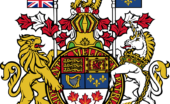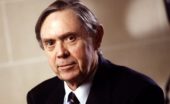Re Ian Bremmer 'Could third-party candidates upend the 2024 US election?' 3 April The current political movement in the USA…
Peter Gzowski, CC July 13, 1934 – January 24, 2002
Written by Diana Thebaud Nicholson // August 31, 2010 // Arts and culture, Canada, Media // Comments Off on Peter Gzowski, CC July 13, 1934 – January 24, 2002
Peter Gzowski: Voice of Canada (video)
For three hours a day, five days a week – for 15 years – millions tuned in to CBC Radio’s Morningside and Peter Gzowski. Despite Gzowski’s dishevelled appearance, this beloved radio host cast his folksy charm across the country. When Gzowski died in 2002, Canadians paid tribute to the broadcaster whose stammering informality and comforting voice had become a symbol for Canada.
Richard Handler: Up close, watching Peter Gzowski listen
(CBC) In a world of books with almost Victorian length subtitles, this newest one on Peter Gzowski simply states: Peter Gzowski: A Biography.
For a man known to ask long and intricately tangled questions, this brief description is, in its own way, ironically appropriate.
R.B. Fleming’s book is the first biography of the late, iconic Canadian broadcaster who hosted CBC Radio’s This Country in the Morning in the 1970s, followed by the splendidly popular Morningside in the 1980s and ’90s.
23 August 2010
A lot of stuff Peter Gzowski just made up
A new biography sets the record straight about many of the CBC radio legend’s stories
(Maclean’s) In the last two decades of the 20th century, Peter Gzowski was as close to a Captain Canada as this country has ever seen. He had his loud detractors, to be sure, and many more who simply wouldn’t have recognized their Canada in his radio universe. But the 350,000 Canadians (and thousands of Americans) who tuned in to CBC’s Morningside every weekday from 1982 to 1997 were enthralled. The everyman hemming and hawing, the hesitant delivery of perceptive questions, the boyish enthusiasm and curiosity—whether addressed to the world yodelling champ (a Canadian, naturally), Leonard Cohen or a prime minister—drew them into Gzowski’s richly imagined nation. One fan named her dog Gzowski, while others wrote the host letters about deeply personal matters (“How are you? Last time I wrote I was just getting over that awful miscarriage”) or lamenting that his retirement would mean the end of “the glue holding Canada together.”
21 August 2010
Robert Fulford: The surprising life of Peter Gzowski
(Globe & Mail) Peter Gzowski, one of the most admired Canadians during the last decades of the 20th century, was what the English used to call a romancer, someone who transforms fiction into fact — “a fantastic liar,” as the Oxford English Dictionary puts it.
That’s not the most striking revelation in R.B. Fleming’s Peter Gzowski: A Biography (Dundurn Press), but it prepares readers for more disturbing material.
Having greatly enjoyed my friendship with him for four decades, I still sometimes brood over his contradictions. He was like an absorbing character in fiction whom the author never quite explains. Fleming is a long-time admirer of Gzowski the broadcaster but doesn’t let that suppress what he’s learned about Gzowski the man. I can’t say more for Fleming than that he’s made me think freshly about a subject I believed I knew well. He’s given us an absorbing, provocative book about a man who was even more complicated than most of us imagined.
Summer 2002
Margaret Webb: 32 Short Pieces about Peter Gzowski
A fractured look at the CBC broadcaster’s year at U of T
(U of T Magazine) Before he became one of the most distinguished journalists in Canada, before he entertained millions of Canadians as host of CBC Radio’s Morningside, before he was known as “Mr. Canada,” Peter Gzowski landed his dream job.
At age 21, in 1956, he became editor of The Varsity. Those of us who held the job after him believed he made it not just the best student paper in the country, but U of T’s “unofficial school of journalism.” He left a legacy that countless Varsity staffers – Thomas Walkom, Linda McQuaig, Bob Rae, Michael Ignatieff, Barbara Amiel – later sweated blood to uphold.
March 2002
Voice of a Chancellor — Trent remembers Peter Gzowski
The Canadian flag atop Trent University’s Bata Library flew at half-mast on January 24th, 2002 as the university community mourned the passing of Chancellor Peter Gzowski. Heartfelt messages poured in over Trent’s Web site and filled more than one condolence book made available on campus. Despite a winter storm, a Memorial Tribute held February 12th drew a large crowd to remember the special man and his impact on so many through the medium of radio, his philanthropy, and his role as Trent’s Chancellor.
Remembering Peter Gzowski
by Douglas M. Gibson
In January, broadcaster, journalist, and author Peter Gzowski died at the age of 67. Gzowski’s publisher, McClelland & Stewart president Douglas M. Gibson, pays tribute to the national icon.
(Quill & Quire) Peter Gzowski was first and last a writer. From his days as an editor at the University of Toronto’s Varsity newspaper in the 1950s through his time at Maclean’s all the way through his career he was a writer. While his presence on the radio made him a national icon, he liked to say that he was a writer who worked on the radio. It was an important distinction. For him the vital skill was not the mastery of the microphone but of the writer’s craft; he had learned to ask the right questions of the right people, to assimilate the knowledge thus produced and then to put it into clear, well-ordered prose. That, to him, was real achievement.
7 February
Peter Gzowski, 67, Raspy Voice Of Homey Radio for Canadians
(NYT) Peter Gzowski, the rumpled host of a national radio program in Canada whose gentle, homey tones gave voice to a generation of Canadians searching for their national identity, died on Jan. 24 in Toronto. He was 67.
Largely unknown in the United States, Mr. Gzowski (pronounced ZAH-ski) was instantly recognizable to Canadians and loved by many, though not all. His gravely voice, roughened by a smoker’s cough, was as familiar as the neighbor next door to listeners to his programs on the Canadian Broadcasting Corporation.
25 January 2002
Peter Gzowski… your thoughts – a heartwarming collection of letters and messages of tribute and affection from Peter’s devoted listeners. Be prepared to tear-up.
Gzowski: he had the courage to be scared
by Robert Fulford
(The National Post) Gzowski knew the difficulty of getting journalism right, and remained terrified by the possibility of getting it wrong. He suffered from doubt before, during, and after even his most remarkable interviews. He understood that, because all events and people are unique, every piece of journalism requires a fresh approach. That was an intimidating thought, but without it, Gzowski’s magnificent career would have been impossible. Others retreated into glib predictability and replayed the ancient questions. Gzowski couldn’t do that. He was afraid of failing to meet the standards he had set for himself. All his life, he had the courage, and the wisdom, to be scared.
Peter Gzowski – Broadcasting’s ‘Mister Canada’
Martin O’Malley and Blair Shewchuk, CBC News Online
So engaging were some of Peter’s Gzowski’s radio interviews that many people who were listening to them on their car radios would drive to the shoulder of the highway or park by the curb on a leafy street so they could better pay attention to what was being said.
He was a giant of radio in this country, “Mr. Canada” to many, “Mr. Broadcasting” to many others. He was a writer, a columnist, a magazine editor, the author of at least 10 books, depending on which ones you count – the marvelous collections of letters sent to This Country in the Morning and Morningside, his personal writings such as The Private Voice, or his elegant true stories of teams and athletes and adventures.
He was also a reluctant and uncomfortable television performer on programs such as 90 Minutes Live and Gzowski & Company. He was a champion of literacy, raising millions for the cause through his annual golf tournaments called the “Peter Gzowski Invitationals” held across the country, even on the ice and the snow of the Arctic (using orange balls).
He loved journalism, though he liked the word “reporter” better than “journalist.” He loved hockey, baseball, golf, contract bridge, cryptic crosswords, the North and the sweep and content of the country. He nearly lost count of the honorary degrees he collected over the years. In 1999, he was appointed Chancellor of Trent University in Ontario, fittingly on July 1 – Canada Day. He held the position until he died.
He died of chronic obstructive pulmonary disease or what is more commonly known as emphysema, “the smoker’s disease.” Gzowski has often discussed and written about his addiction to cigarette-smoking. In the recent book Addicted: notes from the belly of the beast, published by Greystone Books, he wrote a chapter he titled, “How to quit smoking in 50 years or less.” In that chapter he says he smoked three large packages of Rothman’s a day – 75 cigarettes. He wrote, “I have what the health care system, bless its heart, calls COPD, for Chronic Obstructive Pulmonary Disease, but which everyone knows really means emphysema….”
The truth is, Peter Gzowski died of smoking.
He was born on July 13, 1934 in Toronto. When he was six he moved to Galt, Ontario with his mother and her new husband, Reg Brown. In 1948, at the age of 14, he ran away from home and found his paternal grandfather, who managed to have Peter admitted to his alma mater, Ridley College in St. Catharines, Ontario.
Gzowski was the great-great-great grandson of Sir Casimir Gzowski, a Polish noble who was an engineer.
After Ridley, where he graduated with two scholarships, he enrolled at the University of Toronto. He began his journalism career at the Timmins Daily News in northern Ontario, returned to the University of Toronto where he was editor of the student newspaper, The Varsity and worked part-time at The Telegram.
In the spring of 1957, Gzowski became city editor of The Moose Jaw Times-Herald in Saskatchewan. By the fall of 1957 he was managing editor of the Chatham Daily News back in Ontario. The next year he joined the staff of Maclean’s magazine. At the age of 28 he became the youngest-ever managing editor of Maclean’s and became known as journalism’s “boy wonder.”
He turned to radio in the early 1970s, hosting the CBC’s This Country in the Morning and left radio for a disastrous stint hosting the nightly television show 90 Minutes Live. When that show blew up, Gzowski scratched around for writing assignments, wrote the non-fiction books titled The Sacrament and The Game of Our Lives, the story of Wayne Gretzky and the Edmonton Oilers.
It was a lonely time for Gzowski. He lived in Rockwood, a hamlet northwest of Toronto. He felt cut off, banished. “My God, how sometimes the telephone doesn’t ring,” he told a friend.
His return to radio came about as the result of a chance encounter in a restaurant with Barbara Frum, then the star host of CBC Radio’s As It Happens.
“How come I never hear you on the radio any more?” Frum asked.
“Nobody asks me,” Gzowski told her.
“You’re kidding!”
“I wish I were,” Gzowski said.
“Would you sit in for me?” Frum asked.
He eagerly returned to radio and in the fall of 1982 began his sojourn as host of CBC Radio’s Morningside, which lasted 15 years and made him a household name in Canada. The final show was broadcast from Moose Jaw to honour Gzowski’s working connection to that Prairie city.
He told Maclean’s soon after he left the show, “The best interviews were the ones that surprised me. They’re not (necessarily) the ones with the prime minister or the great author, but, rather, people like Elly Danica, a victim of sexual abuse, or a scientist whose work gives him pride. Donna Williams, the autistic woman, was very moving. She talked about the street lights sparkling pink and the colour of each blade of grass. It was quite wonderful.”
It has been estimated Gzowski conducted 27,000 interviews during his tenure at Morningside.
“He brought prime ministers into our kitchens on almost equal footing with rhododendron growers and Inuit throat singers, led a search for the Great Canadian Joke and retried Louis Riel, asked Alice Munro for her tips on making lemon meringue pie and coaxed a Caesar salad recipe out of Joe Ghiz, took the world to Moose Jaw and Moose Jaw to the world, asked questions that seemed to go on forever and listened silently for minutes at a time as ordinary Canadians held a nation-wide audience captive with their words.”
This is how John Allemang of The Globe and Mail described Gzowski in a story he wrote about the end of his long stint with Morningside in May 1997. By this time the show had 1.3 million listeners a week. It was a daily, three-hour, mostly live radio show. Worth noting, too, that 1997 was the year Gzowski won the international Peabody award for broadcasting, a huge honour for a Canadian radio host.
Friends know him as amiable but competitive, ego-driven but generous, cerebral but an “Aw, shucks” kind of Canadian. As a youth at Ridley, he was sensitive about his appearance, mainly because of severe acne, which caused some cruel schoolmates to call him “pus face.”
In a long passage in The Private Voice, Gzowski remembers:
“But in the years before it did clear up, acne – a word I could handle more easily – was the most important factor in my life. I don’t think people who haven’t had the real thing – I’m not talking a few zits here, I’m talking ugly, festering pustules that bleed through your basketball shirt and reduce your social life to Frank Yerby novels – have any idea what it does to a young person’s soul, and if some psychiatrist were to try to explain my sometimes excessive need to be liked on the radio by peering into the history of my epidermis, well, he could have something.”
The New York Times has said of Gzowski:
“In a country forever in search of its own voice, Mr. Gzowski is a stand-in for Canada, as curious as he is courteous, interested in hockey heroes and indigenous customs and all the forgotten chapters of a national history and culture that he constantly challenges his listeners to cherish and defend.”
In his last book, a collection of his essays and columns titled A Peter Gzowski Reader , published by McClelland & Stewart, under the imprint of his longtime publisher Douglas Gibson, Gzowski writes:
“…I’ve had a pretty full life. On radio or television or with a pencil in my hand, I’ve got to meet the Queen, eight prime ministers (nine if you count Margaret Thatcher, who had a cold and couldn’t hear my questions but kept on answering what she’d have liked me to ask anyway), four governors general, two chief justices, two Nobel Prize winners, the world yodeling, whistling and bagpipe champions (all Canadians) and every winner and most of the runners-up of the Giller Prize for Literature. I’ve danced with Karen Kain (well, I made a lifting motion and Karen sprang in the air, light as dandelion fluff), sang with Leonard Cohen (well, Leonard sang and I chanted along to “Tower of Song”), played chess with Boris Spassky (I moved, he moved, I asked if he wanted to resign, he grinned, said sure and we shook hands), golf with George Knudsen, cribbage with Gordon Sinclair and – well, sort of, as we’ve seen – hockey with Wayne Gretzky.”
Gzowski leaves behind his former wife, Jennie, and their five children – Mick, John, Peter, Maria and Alison – and Gillian Howard, the woman Peter always called his “life partner.”


